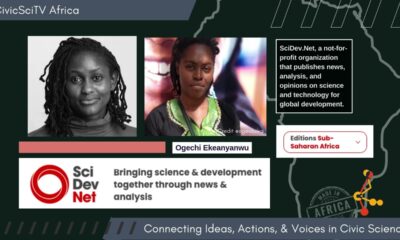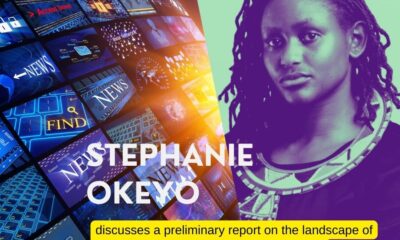Stories in Science Special Series
Books and family: My path towards the world of science
Dinner table discussions centered around political and economic analysis of world events but most importantly the future of the African continent.

– PhD candidate | Stanford University Biology Department –
[dropcap]I[/dropcap] was born in Burundi, a small landlocked country in the heart of Africa. Today, I’m completing my last year of PhD at Stanford University, developing new technologies for the early diagnosis of Tuberculosis. My path was unexpected, one that few Burundian girls have had the opportunity to follow. Looking back on my life so far, two major factors have helped me get here: books and my support network.

Mireille Kamariza
When I was kid, I was curious about space. I would imagine myself becoming an astronaut when I grew up and become the first Burundian woman to get into space. I would research and collect anything that discussed the lives of astronauts, the planets in our solar system, or the universe as a whole. The only problem is that there were very few resources available for a local girl in the city of Bujumbura, where I grew up. The closest thing I ever found that allowed me to channel my passions were old books (especially comic books from the 80’s) – that I would rent from neighborhood libraries. As a result, I spent most of my childhood reading science fiction books.
[su_boxquote] Dinner table discussions centered around political and economic analysis of world events but most importantly the future of the African continent.[/su_boxquote]
Reading stories about flying superheroes and space crusaders helping people in need, not only stoked my passion for the world beyond our atmosphere, but they were my escape from the harsh reality of living during a time when my home country was ravaged by a civil war, poverty and healthcare crisis. For my parents, it was a way to protect me from a world that was falling apart. Furthermore, comic books and science fiction stories stimulated my imagination about the unlimited possibilities of human life – given the right tools of advanced technology, we can achieve the impossible. Books primed my young mind towards the world of innovation and creativity.
My first exposure to critical thinking and my strongest support network is my family. My parents have always valued education. Dinner table discussions centered around political and economic analysis of world events but most importantly the future of the African continent. But as the youngest of four- and the only girl! – I struggled to find the confidence to make my voice heard during family discussions. However, my parents and my brothers encouraged me to participate in the conversations. Through these insightful conversations, I discovered, at an early age, the courage to speak my mind and the ability to think critically and craft well-thought out arguments. This has served me well during my PhD career!
I must admit that my love for reading and the support of my family were not the only thing that helped me overcome the challenges of gender and racial discrimination that the scientific community face today. But my formative experiences certainly have helped me focus and find strength in myself. Though, as a soon-to-be PhD in Biology from Stanford University, I’ve traded my comic books for the latest editions of Science and Nature, my family and their dinner table lessons continue to support and help me grow to this day.
Featured Image by Lynn Friedman is titled “Child reading behind gauze curtain” from Flickr | Some rights reserved
Read More about Mireille Kamariza: A Faster, Cheaper TB Test
Impact
Sessions
Total number of Sessions. A session is the period time a user is actively engaged with the page.
Visitors
Users that have had at least one session within the selected date range. Includes both new and returning users.
Page views
Pageviews is the total number of time the article was viewed. Repeated views are counted.
The CS Media Lab is a Boston-anchored civic science news collective with local, national and global coverage on TV, digital print, and radio through CivicSciTV, CivicSciTimes, and CivicSciRadio. Programs include Questions of the Day, Changemakers, QuickTake, Consider This Next, Stories in Science, Sai Resident Collective and more.

-
Audio Studio1 month ago
“Reading it opened up a whole new world.” Kim Steele on building her company ‘Documentaries Don’t Work’
-
Civic Science Observer1 week ago
‘Science policy’ Google searches spiked in 2025. What does that mean?
-
Civic Science Observer1 month ago
Our developing civic science photojournalism experiment: Photos from 2025
-
Civic Science Observer1 month ago
Together again: Day 1 of the 2025 ASTC conference in black and white
Contact
Menu
Designed with WordPress























